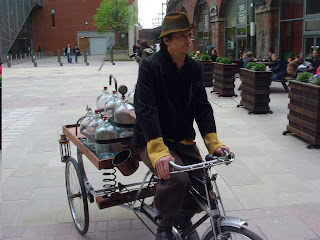It would be difficult to consider “I Am Anonymous” by Headspace without taking into consideration the line up. The band consist of Damian Wilson on vocals, Pete Rinaldi on guitar, Richard Brook on drums, Lee Pomeroy on bass and on keyboards Adam Wakeman, son of Rick. With names such as these on the sleeve it would be hard to analyse the album as a piece of work in its own right, but it would appear churlish to take the album out of this context. The press release for the album cites influences from Rush, Yes, Genesis and Dream Theater, and these can be heard to permeate each piece on this release. Described loosely a concept album dealing with how the listener relates to humanity and the battles fought inside the mind, preconceptions are mounting.
“Stalled Armageddon” sets the pace well, with heavily guitar laden passages, dream like vocals, and keyboard lines that are never obtrusive. There are the characteristic changes in tempo, time signature and mood, but these seem to flow seamlessly without appearing awkward or contrived. According to Wakeman, due to commitments to other projects (including his contribution to Ozzy Osbourne’s band) the album has taken almost four years to complete, and as a result may be considered fractured. Close scrutiny of these tracks does not give the listener this impression in the least however, rather, a carefully considered, cohesive concept.
“Fall of America” opens with grandiose guitar riffs riding on the back of towering keyboard lines, which punctuate delicate vocal passages, prior to the majestic closing. The delicate “Soldier” forms an ideal interlude, with chiming bells and uncomplicated keyboard phrases, whilst “Die with a Bullet” is exhilarating and authoritative. The almost cathedral like opening to “In Hell’s Name” gives way to further flamboyant musicianship, which is broken up with subtle acoustic sections. Subtlety and poignancy introduce the longest track on the album “Daddy Fucking Loves You” (?) which gently give way to epic guitar riffs, science fiction keyboard lines and King Crimson-like time signatures. Every element of the bands influences shine through on this piece, with sections that are reminiscent of classic Yes and Rush....

















